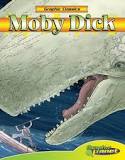Moby-Dick Page #19
Moby-Dick; or, The Whale is an 1851 novel by American writer Herman Melville. The book is sailor Ishmael's narrative of the obsessive quest of Ahab, captain of the whaling ship Pequod, for revenge on Moby Dick, the white whale that on the ship's previous voyage bit off Ahab's leg at the knee.
Was there ever such unconsciousness? He did not seem to think that he at all deserved a medal from the Humane and Magnanimous Societies. He only asked for water—fresh water—something to wipe the brine off; that done, he put on dry clothes, lighted his pipe, and leaning against the bulwarks, and mildly eyeing those around him, seemed to be saying to himself—“It's a mutual, joint-stock world, in all meridians. We cannibals must help these Christians.” CHAPTER 14. Nantucket. Nothing more happened on the passage worthy the mentioning; so, after a fine run, we safely arrived in Nantucket. Nantucket! Take out your map and look at it. See what a real corner of the world it occupies; how it stands there, away off shore, more lonely than the Eddystone lighthouse. Look at it—a mere hillock, and elbow of sand; all beach, without a background. There is more sand there than you would use in twenty years as a substitute for blotting paper. Some gamesome wights will tell you that they have to plant weeds there, they don't grow naturally; that they import Canada thistles; that they have to send beyond seas for a spile to stop a leak in an oil cask; that pieces of wood in Nantucket are carried about like bits of the true cross in Rome; that people there plant toadstools before their houses, to get under the shade in summer time; that one blade of grass makes an oasis, three blades in a day's walk a prairie; that they wear quicksand shoes, something like Laplander snow-shoes; that they are so shut up, belted about, every way inclosed, surrounded, and made an utter island of by the ocean, that to their very chairs and tables small clams will sometimes be found adhering, as to the backs of sea turtles. But these extravaganzas only show that Nantucket is no Illinois. Look now at the wondrous traditional story of how this island was settled by the red-men. Thus goes the legend. In olden times an eagle swooped down upon the New England coast, and carried off an infant Indian in his talons. With loud lament the parents saw their child borne out of sight over the wide waters. They resolved to follow in the same direction. Setting out in their canoes, after a perilous passage they discovered the island, and there they found an empty ivory casket,—the poor little Indian's skeleton. What wonder, then, that these Nantucketers, born on a beach, should take to the sea for a livelihood! They first caught crabs and quohogs in the sand; grown bolder, they waded out with nets for mackerel; more experienced, they pushed off in boats and captured cod; and at last, launching a navy of great ships on the sea, explored this watery world; put an incessant belt of circumnavigations round it; peeped in at Behring's Straits; and in all seasons and all oceans declared everlasting war with the mightiest animated mass that has survived the flood; most monstrous and most mountainous! That Himmalehan, salt-sea Mastodon, clothed with such portentousness of unconscious power, that his very panics are more to be dreaded than his most fearless and malicious assaults! And thus have these naked Nantucketers, these sea hermits, issuing from their ant-hill in the sea, overrun and conquered the watery world like so many Alexanders; parcelling out among them the Atlantic, Pacific, and Indian oceans, as the three pirate powers did Poland. Let America add Mexico to Texas, and pile Cuba upon Canada; let the English overswarm all India, and hang out their blazing banner from the sun; two thirds of this terraqueous globe are the Nantucketer's. For the sea is his; he owns it, as Emperors own empires; other seamen having but a right of way through it. Merchant ships are but extension bridges; armed ones but floating forts; even pirates and privateers, though following the sea as highwaymen the road, they but plunder other ships, other fragments of the land like themselves, without seeking to draw their living from the bottomless deep itself. The Nantucketer, he alone resides and riots on the sea; he alone, in Bible language, goes down to it in ships; to and fro ploughing it as his own special plantation. There is his home; there lies his business, which a Noah's flood would not interrupt, though it overwhelmed all the millions in China. He lives on the sea, as prairie cocks in the prairie; he hides among the waves, he climbs them as chamois hunters climb the Alps. For years he knows not the land; so that when he comes to it at last, it smells like another world, more strangely than the moon would to an Earthsman. With the landless gull, that at sunset folds her wings and is rocked to sleep between billows; so at nightfall, the Nantucketer, out of sight of land, furls his sails, and lays him to his rest, while under his very pillow rush herds of walruses and whales. CHAPTER 15. Chowder. It was quite late in the evening when the little Moss came snugly to anchor, and Queequeg and I went ashore; so we could attend to no business that day, at least none but a supper and a bed. The landlord of the Spouter-Inn had recommended us to his cousin Hosea Hussey of the Try Pots, whom he asserted to be the proprietor of one of the best kept hotels in all Nantucket, and moreover he had assured us that Cousin Hosea, as he called him, was famous for his chowders. In short, he plainly hinted that we could not possibly do better than try pot-luck at the Try Pots. But the directions he had given us about keeping a yellow warehouse on our starboard hand till we opened a white church to the larboard, and then keeping that on the larboard hand till we made a corner three points to the starboard, and that done, then ask the first man we met where the place was: these crooked directions of his very much puzzled us at first, especially as, at the outset, Queequeg insisted that the yellow warehouse—our first point of departure—must be left on the larboard hand, whereas I had understood Peter Coffin to say it was on the starboard. However, by dint of beating about a little in the dark, and now and then knocking up a peaceable inhabitant to inquire the way, we at last came to something which there was no mistaking.
Translation
Translate and read this book in other languages:
Select another language:
- - Select -
- 简体中文 (Chinese - Simplified)
- 繁體中文 (Chinese - Traditional)
- Español (Spanish)
- Esperanto (Esperanto)
- 日本語 (Japanese)
- Português (Portuguese)
- Deutsch (German)
- العربية (Arabic)
- Français (French)
- Русский (Russian)
- ಕನ್ನಡ (Kannada)
- 한국어 (Korean)
- עברית (Hebrew)
- Gaeilge (Irish)
- Українська (Ukrainian)
- اردو (Urdu)
- Magyar (Hungarian)
- मानक हिन्दी (Hindi)
- Indonesia (Indonesian)
- Italiano (Italian)
- தமிழ் (Tamil)
- Türkçe (Turkish)
- తెలుగు (Telugu)
- ภาษาไทย (Thai)
- Tiếng Việt (Vietnamese)
- Čeština (Czech)
- Polski (Polish)
- Bahasa Indonesia (Indonesian)
- Românește (Romanian)
- Nederlands (Dutch)
- Ελληνικά (Greek)
- Latinum (Latin)
- Svenska (Swedish)
- Dansk (Danish)
- Suomi (Finnish)
- فارسی (Persian)
- ייִדיש (Yiddish)
- հայերեն (Armenian)
- Norsk (Norwegian)
- English (English)
Citation
Use the citation below to add this book to your bibliography:
Style:MLAChicagoAPA
"Moby-Dick Books." Literature.com. STANDS4 LLC, 2024. Web. 27 Dec. 2024. <https://www.literature.com/book/moby-dick_18>.




Discuss this Moby-Dick book with the community:
Report Comment
We're doing our best to make sure our content is useful, accurate and safe.
If by any chance you spot an inappropriate comment while navigating through our website please use this form to let us know, and we'll take care of it shortly.
Attachment
You need to be logged in to favorite.
Log In